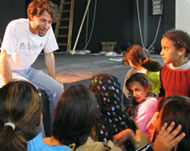Theatre gives hope to children of Jenin
A new theatre is bringing alternative plays to the residents of the Jenin refugee camp in the West Bank to help educate children and adults.

The idea of a theatre and drama workshop might normally sound out of place in the notoriously blighted camp in the northern West Bank.
But these concepts are alive and well after the founding of the Freedom Theatre in February.
“I feel some kind of freedom here,” says 13-year-old Sabin, sitting outside the theatre.
About 20 other girls who have just finished a drama workshop agree.
“It strengthens my personality and gives me freedom of expression,” says Aisha, also 13.
The Israeli actor and director, Juliano Mer-Khamis, who co-founded the theatre, said: “We wanted to create a cultural centre that will empower, bring knowledge to the children of Jenin.
“We want to try together with them to reduce the vicious effect of the occupation, as a means of joint struggle.”
Recently, the theatre hosted two performances: a play for children about the wise fool Joha and a political satire for adults.
Packed house
While clashes flared during a military raid, the theatre workers say they were setting up the stage and arguing over which spotlights to use.
Both performances attracted about 1,000 people to a 400-person-capacity theatre.
“The interest in the camp for these activities is completely massive. If we had three or four performances, we still wouldn’t be able to get everyone in,” says co-founder Jonatan Stanczak, a Swedish paediatric nurse based in Haifa.
The aim is to hold weekly performances.
|
“When the children come here, they are something. They can stand in a hall, and it becomes their autonomous space, physically and emotionally” |
Additionally, Mer-Khamis and Stanczak are running workshops for children.
After less than a month of regular drama workshops, the children cannot keep away, many turning up after school with songs, poems and scenes that they want to perform.
Stanczak said that the workshops run four or five days a week and that sometimes up to 200 children attend.
During one workshop, Mer-Khamis stands among about 60 children and performs a comic mime routine.
The children are laughing, and one by one are invited to join in. Then they put on a performance of their own, about their experiences of the local UNRWA school, with a focus on their disciplinarian teachers.
“What I see in Jenin are destructed, disordered children who are not able to concentrate for more than five minutes,” says Mer-Khamis.
The theatre project seeks to reverse all that.
Community project
Mer-Khamis says: “First and most important of all is that when the children come here, they are something. They can stand in a hall, and it becomes their autonomous space, physically and emotionally.”
With a strong local support, the theatre is slowly turning into a community project.
“People are volunteering all the time, telling us they’ll stay and work, that we should go home before the gates [to exit Jenin] close,” Mer-Khamis said.
 |
|
Stanczak (L) says up to 200 children |
The theatre is a reincarnation, building on the legacy of the Israeli Arna Mer-Khamis, who founded an alternative education system and theatre group in Jenin that fell apart after she died in 1995.
The new theatre took less than six months to set up and was initiated last year by Stanczak, who by chance met Zakaria Zubaidi, leader of the Jenin branch of al-Asqa Martyrs Brigades and one of Arna’s former theatre pupils.
Abrupt end
Zubaidi said he wanted to re-establish ties with the Jewish peace movement.
“It was his words, his way of talking about Arna’s project” that inspired Stanczak to contact Mer-Khamis and Dror Feiler, a Swedish composer and activist, with the idea of re-creating the theatre, says Stanczak.
Mer-Khamis’ professional acting career in Israel came to an abrupt end at the onset of the second intifada.
One of Arna’s former pupils had just carried out a suicide attack in Israel, and when Mer-Khamis dedicated a poetry reading to his dear friend, Yusuf, Mer-Khamis was vilified.
“I became a suicide supporter,” he says. “Friends, actors, said I should be fired … people started to picket my shows and cancel their subscriptions to the theatre, TV became out of the question for me and advertising campaign work was cancelled.”
He is glad to be involved in the Freedom Theatre project today. “Life, luck and the politics of this region gathered together and enabled me to do it,” he says.